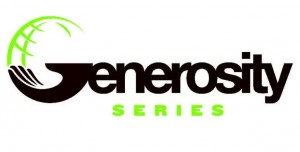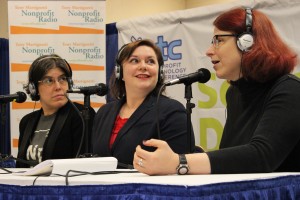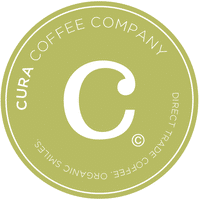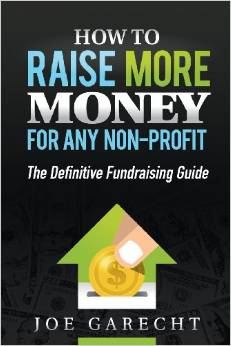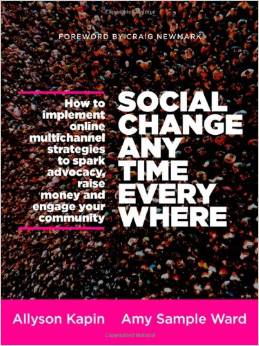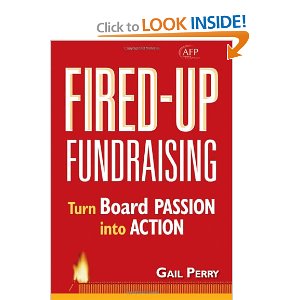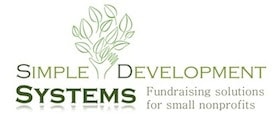Big Nonprofit Ideas for the Other 95%
I Love Our Sponsor!
Sponsored by Generosity Series, a nationwide series of multi-charity 5K events that provide a proven peer-to-peer fundraising platform to charities and an amazing experience for their participants.
Listen Live or Archive:
- On Fridays at 1pm Eastern: Talking Alternative Radio
- Listen to the October 31, 2014 archived podcast
My Guests:
Gene Takagi: 10 Scary Scenarios
 It’s our Halloween show, and Gene Takagi is back! He’s our legal contributor and principal of NEO, the Nonprofit & Exempt Organizations Law Group. He’s assembled a list of no-no’s that he sees too too often.
It’s our Halloween show, and Gene Takagi is back! He’s our legal contributor and principal of NEO, the Nonprofit & Exempt Organizations Law Group. He’s assembled a list of no-no’s that he sees too too often.
Amy Sample Ward: Treats In Tech Trends
 Amy Sample Ward is back! She’s our social media contributor and CEO of NTEN, the Nonprofit Technology Network. She’s got takeaways from the 2014 Fundraising Technology Trends Study.
Amy Sample Ward is back! She’s our social media contributor and CEO of NTEN, the Nonprofit Technology Network. She’s got takeaways from the 2014 Fundraising Technology Trends Study.
Top Trends. Sound Advice. Lively Conversation.
You’re on the air and on target as I delve into the big issues facing your nonprofit—and your career.
If you have big dreams but an average budget, tune in to Tony Martignetti Nonprofit Radio.
I interview the best in the business on every topic from board relations, fundraising, social media and compliance, to technology, accounting, volunteer management, finance, marketing and beyond. Always with you in mind.
Sponsored by:
View Full TranscriptTranscript for 215_tony_martignetti_nonprofit_radio_20141031.mp3
Processed on: 2018-11-11T23:27:31.128Z
S3 bucket containing transcription results: transcript.results
Link to bucket: s3.console.aws.amazon.com/s3/buckets/transcript.results
Path to JSON: 2014…10…215_tony_martignetti_nonprofit_radio_20141031.mp3.583160524.json
Path to text: transcripts/2014/10/215_tony_martignetti_nonprofit_radio_20141031.txt
Oppcoll hello and welcome to tony martignetti non-profit radio big non-profit ideas for the other ninety five percent i’m your aptly named host and it’s halloween happy halloween! I hope that you do something fun for yourself or with your kids. Do something fun today i want to welcome again opportunity collaboration if you’re listening from that wonderful unconference that we were all at two ragas is three weeks ago now welcome welcome to the show, a pleasure to have you from opportunity collaboration in stop of mexico and i’m glad you’re with me. I’d be forced to suffer with clinical vampirism if i had to swallow the fact that you missed today’s show ten scary scenarios jean takagi is back he’s, our smart legal contributor and principle of neo the non-profit and exempt organizations law group he’s assembled the list of no knows that he’s seen too too often and treats in tech trends. Amy sample ward is back she’s are savvy social media contributor and ceo of n ten, the non-profit technology network. She’s got takeaways from the twenty fourteen fund-raising technology trends study between the guests on tony’s take two possum shooting responsive by generosity, siri’s hosting multi charity five k runs and walks and i’m very glad that gene takagi is back month after month. I love it. He’s, the managing attorney of neo in san francisco, the non-profit and exempt organizations law group he edits the popular non-profit law blogged dot com and on twitter he is at gi tak gt a welcome back, jean. Thanks so much, tony. Great to great to be back. And i’m glad to hear you had a good time with opportunity collaboration. I had a chance to go a few years back, did you? You were there a couple years ago. I wass oh, it’s ah, it’s really wonderful experience and it demeans it to call it a conference. It’s it’s, it’s definitely an unconference absolutely wonderful. I i didn’t know you had been there. Cool. All right. Are you thinking about going back? Twenty fifteen? Maybe a couple years down down the road. I would love to go back. Okay? It is very special all around poverty alleviation. So you’ve got some some scary scenarios for us for the halloween show and, uh, one of them is being sued. Yeah, absolutely. I’m probably one of the most terrifying things. For for a non-profit as we go through our list of ten non-profit nightmares getting sued, and particularly if it’s by an employee for something like discrimination or sexual harassment, wrongful termination, privacy violations that can just be terrifying and it’s just, uh, more common than people might think. Yeah, i get well, first of all, you have to credit unite non-profit nightmares. I didn’t think of that one. I thought of scary scenarios. I like non-profit nightmares better. Actually, i wish i wish you wish we had said that. All right, but we’ll stick with scary scenarios. Yeah, seeing your organization and it could even be you individually, right on the on the wrong side of ah, of the little v that stands for against it’s ah it’s. Very disconcerting. Yeah, absolutely. And it could be the nonprofit organization itself. Or it could be one of the non-profits leaders, manager, executive, director or even the board of directors who could all be serving in volunteer capacities, finding themselves on that other side of the law on dh there named as individuals. Right? So they have they individually have to come up with a defense happen and all the legal. Costs that are involved unless they have some sort of insurance that’s going to protect. Okay? And we talked about that. That would be the directors and officers insurance. Yes, you know? And if we’re talking about an employee lawsuit to make sure that directors and officers insurance has some sort of employment practices, liability protection involved, employment practices, liability protection, okay, so if you’re so that’s, what that’s to cover you if you’re sued for some kind of a discrimination in discrimination action? Yeah, discrimination, sexual harassment, wrongful termination, all those type of claims. Okay, way have talked about that. Do you know our directors and officers liability insurance? Very worthwhile having don’t you know, i’m not sure we did mention before i think it’s a majority of all employers that have face to claim sometime within the past five years, i think it’s a little less for non-profit employers with directors and officers insurance, but the average settlement again from some of the materials i’ve read between thirty and forty thousand dollars average defense costs, if you decide to go to court with it, could be about the same, and two thirds of the court cases favor the employees or the plaintiff against the non-profit or non-profit leaders so something really aware of and try to mitigate those risks? A majority are sued on that that’s on the corporate side, more than fifty percent. I’ve haven’t think overall employers over or some sort of claim, okay, past five years. And if you go to trial there’s a two thirds likelihood that the employer is going to lose is that right? Yeah. That’s what i’ve read, i don’t know it, and i think it varies amongst your jurisdiction. So i think california might be, for example, a little bit more employee friendly states like delaware, maybe a little bit more employer friendly. Okay. Okay, well, i trust that you’re reading reliable sources. So when you say through your reading, it’s reliable, i believe you. I believe the sources do that. You trust what else? We have something else we’ve talked about. Excess benefit transactions bother you? Yeah. I mean, that’s, that’s. Something really scary. And just for yeah, for people out there who might not know what that is. That’s basically just excessively paying one of your directors or officers or a family member of a director or officer. Or a business that’s controlled are owned by by one of your directors or officers. We just call them insiders, and when insiders get paid too much there, if they get caught, they’re going to have to return that excessive amount on pay a penalty tax, which could be twenty five percent of that access. So if you overpaid by ten thousand dollars, for example, the penalty would be twenty, five hundred. If you overpaid by one hundred thousand dollars, the penalty would be twenty five thousand. But the scarier thing is that if you don’t correct that within this given time period, basically, before you get assessment on an assessment from the irs, the penalty jumps up to two hundred percent of that excessive amount. So instead of twenty five hundred dollars penalty for a ten thousand dollar excessive payment, all of a sudden you have to return the ten thousand dollars and pay twenty thousand dollars in a penalty tax free iraq. So it could be a really, really scary thing and one of the major irs tools they have against preventing that type of self dealing type transaction to occur. Oh, that’s, the tool, the penalty, the penalty tax and it it really can be pretty harsh. The the other scary thing about about this is that the irs can actually even penalize the board members who approved that transaction, even if they didn’t benefit a benefit from it if they knew that transaction to be excessive, or they reasonably should have known that it was excessive and didn’t look into it. So even board members who don’t benefit from it can be hit with a penalty tax that would be equal to ten percent of the excessive amount. So they got a really careful, and we talked a little bit about this, but and there are procedures to help shift the burden of proof so that if the irs claims that you paid excessively, if you follow these procedures, which are it’s going to get me into jargon jail, you yeah, i know. But, you know, you were thinking over you’ll get yourself right out. You did last time. Do yeah. It’s called the rebuttable presumption of reasonable miss procedures and basically what it means is that there’s a presumption that the compensation was reasonable if you followed the steps and basically it’s just the interested party discloses the interest to the board. The board votes on it in the majority who are not interested in that transaction favorite. And they based that that approval on comparables that are that are reasonable comparables for that. And if you do that, then the irs has the burden of proof to prove that it was excessive. The irs usually doesn’t want to go through all of that, so they’re going to pick pick lower hanging fruit to go after in most okay. And the last time we talked about this was the march twenty second twenty thirteen show. If anybody wants to go back and we did talk a decent amount, i think about that that reasonable, the presumption of reasonableness on dh what what the cops should look like and things like that, okay, yeah, i mean, there’s, some really there’s, some serious penalties. Now, these are things that you see, right? Yeah, we see them fairly often if you if you make a payment toe one of your insiders and you don’t report it to the irs is a payment and they don’t report it to the irs. Sometimes people call them stipends and things and nobody reports it anywhere, and you get caught with that that’s automatically and access benefit transaction there. There doesn’t have to be any investigation. If that happened, you’re automatically hit with that penalty tax, so be very, very careful. All right, we have ah, we have a bunch more to go through. Ah, ten scary scenarios non-profit nightmares were going to go out for a couple minutes when we come back. Jean, i’ll keep going. You’re tuned to non-profit radio tony martignetti also hosts a podcast for the chronicle of philanthropy fund-raising fundamentals is a quick ten minute burst of fund-raising insights published once a month. Tony’s guests are expert in crowdfunding, mobile giving event fund-raising direct mail and donor cultivation really all the fund-raising issues that make you wonder, am i doing this right? Is there a better way there is? Find the fund-raising fundamentals archive it. Tony martignetti dot com that’s marketmesuite n e t t i remember there’s a g before the end, thousands of listeners have subscribed on itunes. You can also learn maura the chronicle website philanthropy dot com fund-raising fundamentals the better way dahna welcome back to big non-profit ideas for the other ninety five percent. Gotta send live listener love and let’s start abroad. I wonder if some of these listeners are from from opportunity collaboration mexico city, mexico when a star dies, sir j frantz, bonn jur, dusseldorf, germany, gooden, tog and lots of asian listeners, many in japan, tokyo, hiroshima, mito, kyoto, konnichi juana let’s come back to the u s new bern, north carolina live listener love, beverly, massachusetts and woodbridge, new jersey there’s. Lots more live listener love coming, of course, podcast pleasantries to those of you listening wherever you may be at whatever time you’re listen, whatever day, whatever activity you’re doing pleasantries to the podcast crowd almost ten thousand of you, jean let’s, continue with our with our non-profit nightmares. I’m taking on your non-profit nightmares because i like it better than my scary scenarios. What else you got for us? Nightmares or scary scenarios. My third choice is not withholding and cheering, paying payroll taxes. That is just a terrifying things. Look at gene’s got sound effects, some affection sound effect from san francisco about that because it’s, often done because of poor budgeting at organization, doesn’t have enough to pay payroll taxes and decided to defer payment and make sure that it’s making payroll in paying vendors on dh just ah, delaying or deferring the irs payments. But if you don’t pay payroll taxes, there are very, very harsh penalties and interest. Ah, and the scariest thing about that is directors could be personally liable, and i’ll repeat that again, volunteered directors could be personally liable for paying the taxes, the interests and the penalties that hadn’t been properly withheld in paid because the attorneys generals may think this isn’t she shouldn’t be paid with charitable resource is this is a deficiency or breach of fiduciary duty, and it really should be paid by the directors, so not withholding and paying payroll taxes really, really scary. Damn all right, and a lot of personal potential liability. This is the independent contractor versus employee, right? Well, that’s another way, there’s the first way. That is just not saying it because you’re paying other. Okay, okay, having an employee, but not paying. It. And then the other is misclassifying someone as an independent contractor to avoid paying it exactly right. You might not think you’re doing get to avoid pay. You might just think, well, i have a choice as an employer whether to classify a worker’s, an independent contractor, an employee. But of course, you don’t necessarily have that choice. Your guest. A few weeks ago, i had explained that’s, right? That was you eat huge tomb and he’s a c p a. And that show was on june sixth, and i have a guest here in the studio, jessica allen, who was a bookkeeper, and she’s nodding her head vigorously. Yes, to everything you’re saying. Because clearly, jessica sees this mischaracterization a lot or the failure to pay the taxes. Yes, both. Yes. Just kisses on both. Uh, whatever the june six show, we talked a lot about that with huge tomb. What else you got? So the next one i have is endorsing a political candidate for public office. And five a onesie. Three’s air definitely not allowed to do that. And the penalty can be revocation of their tax exempt status so they can lose their five. Twenty. Three status if they endorse a political candidate. Now, i think most organizations are savvy enough not to go in directly endorse a candidate or make a political contribution to a candidate, but they can also happen unintentionally just by inviting someone to speak at a charity event who might be an incumbent. I’m not giving them explicit instructions that she or he can’t campaign at the event or creating a legislative scorecard that compares candidates on a select number of issues important to the non-profit but it’s not done in a non partisan manner. Okay, so it can be done, but it has to be ah, has to be done equitably fairly across all the different opinions. Yeah, you’ll sometimes seemed the organizations like the legal world women voters come up with with legislative score cars and and they’re going to be a comprehensive look att just a broad array of legislation in how that candidates particular candidates foreign office may have voted in-kind such legislation, but they’re not going to just be selected to important issues to that non-profit their going to cross honore of areas and that’s that’s the way to do it nonpartisan if you just sort of select the things that are important to your organization, whether it be women’s rights or an environment or climate change, then you can really get in trouble that way. Okay, you can also get in trouble in social media, like on when someone posts on your facebook page, for instance, yeah, absolutely. So imagine somebody posting on your facebook page that you should vote for a political candidate for public office and you moderate the page. So you you really cleanse it of any defamatory statements or anything like that. But you don’t you leave those items up there? Well, that could be seen as tacitly endorsing the candidates enough, and you’re responsible for that for that facebook page, and you have that control. So by leaving it up, you expose yourself. Now what if you what if you don’t monitor your facebook page? Well, that makes that makes it a little bit more tricky. T now that we would just advise people to be careful of that anyway, because there’s all sorts of statements on that facebook page that might get you in trouble in other ways. All right, so that’s, why you leave them up? Okay? But it becomes more of an issue that you’d have to take a look at all the facts and circumstances if you don’t moderate it all. And there are few political endorsement from the general public, not from your staff and not from your volunteers, but from the general public. Okay, on dh, you can also get into trouble if someone makes a personal endorsement, right? And then it gets perceived to be organizational. Yeah, so you’ll see a lot of times, executives or sometimes board members endorse a political candidate, and their affiliation with the non-profit is going to be listed in that advertisement, or or endorsement. And if it’s done properly, there’s going to be some sort of disclaimer there that says that the organizational affiliation is written for ours, included just for identification purposes and in no way shows that the organization is also endorsing the candidate. But without that disclaimer, it might be seen specially if it’s an executive director or chair, the board that the organization self is improperly endorsing a political candidate again could jeopardize the organization’s exempt status. Okay, so so a simple disclaimer will cover us there. Yeah, but the, you know the non-profits not in control of that page. So you’ve got to make sure that your executives know if they’re going to allow their names and the organizational affiliations to be put onto a newspaper or some other advertisement for the benefit of a political candidate that they insist that that disclaimers there and the penalty for this is pretty severe. You mentioned loss of your five a onesie three status? Yeah. Is that all you want? You got to say more than. Yep. Come on. Well, i mean, how often does is how often does this happen either, yet either say more than yet, forgive me the living in that scary, that screaming which again? But, you know, so, you know, i mean handup okay, how often do you see that? That that sanction? Uh, you don’t see it very often because organizations are usually pretty good about it. And if you you know, if it happens once or twice tow an organization over a number of years, they might be a little lax about it. But if it combined with other things that show that you are really pushing it on endorsing political candidates, if not directly, indirectly then then you do see a few times i wouldn’t i wouldn’t say it’s a very common, but you do see a few times organisations lose their tax exempt status, and whenever it’s election season we see it more. I presume you would get a warning letter from the irs first depends how how bad your other activities are in terms of endorsing. So we talked about that legislative score card if you did that in a partisan matter, if you were allowing the particular candidate teo, get mohr you side of your organizational resource is than other candidates for the same office, and it showed that you were really acting in a partisan manner on a particular election, there could be a complaint from the other side and it’s the complaint that would likely launch the audit or investigation and that’s where you could be in danger of losing your tax. That man you get, the irs is investigating you, even if it’s not, we’re not even talking about a tax audit here. We’re talking about activity around election hearing i just that’s something i don’t think you want. I don’t think you want any government agency pouring through. Your emails and your social media pages, and i don’t know what else they would look at internal communications, maybe boardmember it’s oh, man, that sounds like a really nightmare. Talk about nightmare. Yeah, and on the other hand, tony, you’ve got to be careful not to tell any individual staff members, including your executive, that they can’t endorse political candidates because, of course, they have constitutional rights that they can as individuals endorse anybody they want, but they just can’t use that organizational affiliation without some sort of disclaimer. Have you ever been through an audit like this again? Not talking about tax, but whether it’s election hearing or anything else? Where the where the irs was questioning the activities of ah, of someone you were a client, you’re representing an organization? Not to the extent that they were threatening revocation, but we’ve certainly dealt with dad let’s examinations of political statement. Yeah, what is that? Like? What? How detailed do they get? Well, maybe that’s segways into my next nightmare and that’s having the i r s or the attorney general audit your organization regardless of whether they find anything writer or wrong it’s usually like when somebody surprises you and visit your home, or at least my home, and you haven’t had a chance to do any housekeeping that, you know, if you really dig in, teo, be probably confined all sorts of tiny little buy-in actions and one on a while you might be able to find more bigger violation that you don’t want to get out there, either to the irs or to the general public, including your donors and supporters, because they could be very embarrassing to the organization that going through an i r s or attorney general audit that, you know, if you’re lucky, it’s it’s, a correspondent, thought it, meaning that they’re just asking for paperwork. Okay, unlucky. They come into your office and they lived there basically for weeks and maybe even months or even longer. What are they doing? What are they doing? For weeks and months? They’re scouring all of your books. They’re interviewing employees to see whether you’ve done anything right or wrong right now they’re looking for something wrong. Yeah, and hopefully you’re telling them all good things so that you stay out of trouble, but if they’ve got reason, if they feel like they’ve got reason to investigate you, they could be in there for a very long time looking for for for that dirt. So you’ve got to be very, very cautious, damned if you’re going to if you get any sort of notice from the irs or your your state’s attorney general that they’re going to conduct some sort of audit on your organization, contact an attorney right away. You want to make sure that you’re prepared so you can get your house in order a little bit before they come. And if you don’t have the right policies in place to sort of mitigate what you know, poor responses they may have of your organisation, that that you get a chance to develop those policies during that interim period before they come. So at least you could say you’re proactively taking steps already even before they’ve noted anything. Do you have to give them office space? I mean, what if you tell them our officer’s? You know, it’s very crowded here, there’s just no desk space available for you. Can you keep them out that way? You know that we don’t have a phone or desk outlet stores, outlets, outlets are very scarce is that yeah, if you’re very very tiny than then, you know, there may not be a facility to sort of for them you’re right about that. I mean, keep them in the hallway or something, or in the elevator shaft or down in the lobby, maybe wherever it’s going to be, you’re not going to be a very pretty sight, but if you have your books in order and you’re giving them information and you’re very cooperative and you have a very active board with good minutes of board meetings that show proper due diligence that’s really going to help you in an audit, but if you’re careless, if you don’t have a lot of policies, if the board is really just rubber stamping decisions of the executive that’s going to be pretty evident quickly and an audit and that’s going to make him stay longer, well, that’s yeah, exactly, and we’ve talked about this before, too, but i’m glad we’re reiterating. Not following your own policies on dh you you cite a good example of governance policies when an organization says that they want to follow robert’s rules of order? Yeah, i mean, so you know, i often see by-laws of organizations that say we will follow our we must follow robert’s rules of order, which is, you know, six hundred to seven hundred pages that’s updated every once in a while every couple of years, and you’re you’re agreeing to incorporate all of that as rules of your organizations. And for most charities, that just doesn’t make any sense, and it creates all sorts of possibilities for a dissenting director or a dissenting member to find a procedural defect in those six hundred pages that you didn’t comply with and reverse or stop any action that the majority of the board might have wanted to take and thought they had taken all the center just to be hit with this, you’ve got a procedural defect, i’m questioning the action and going to reverse it, and maybe i’ll sue you if you if you say that you just disregarding my statement because our by-laws say we’ve gotta follow these rules. I see. Okay, so it’s as if it is incorporated into the by-laws okay, we just have a couple minutes left, and i know there’s other things we want to talk about, um, but we won’t be able to spend quite as much time the you could be you could be perceived as a private foundation, even though you’re a public charity. Yeah, most public charities become public cherries by passing this math tests, the most common test is a one third public support test that’s measured over a five year rolling period. And if you get enough small donations from the general public, you’ll meet that test. But one big private foundation grant, especially if you’re on the borderline of that one there’s support one big private foundation grant could tip you over into public chair, i mean, into private foundations status, and if that happens, most private foundations will no longer make grants to you because they only make grants to public charities and not the other private foundations. So it’s a very, very terrifying concern for any public charity that sitting on the borderline of their public support especially if it’s lower than one third and they’re going to get a big private foundation grant. Okay, way. Have to move on. What else? What’s another one napor ten delegating things to individuals you don’t know very well so maybe you let your volunteers run. From events for you, but you don’t do background checks on them, it’s kind of like, would you allow someone to care for your child without checking on their background? Probably not. I hope not. But would you allow volunteers to take care of other people’s children without checking on their background? Maybe in a kind of summer camp situation? Or do your employees, board members or other volunteers you know, have they been vetted and trained to be responsible for activities that you’ve told them to be responsible for? How how are these supervised? Okay, they embezzle or engage in fraudulent activities? Did anybody conduct a background check before they were put in a position to be able to do that? Those air, all terrifying concerns for me, there’s one around social media, which i am going to summarize for us, and we’ve talked about it and amy sample ward and i have talked about it too, which is making sure that you have a social media policy. And why don’t you give us our last one of the ten nightmare non-profit nightmares? Gene? Sure, signing a contract if you can’t live up to it, you know you get hit with breach of contact. You damage your reputation. Maybe you can’t make a required payment or you can’t deliver the promise. Good or service or you rep misrepresent facts that you said that were true inn representations and warranties in the contract that you didn’t carefully check. You do that you can really hurt your reputation. You could get sued very, very ugly non-profit nightmare jean takagi, managing attorney of neo non-profit and exempt organizations law group in san francisco. You’ll find him on twitter at g tak. And you also and it’s the non-profit law blawg dotcom. Thank you very much, gene. Always a pleasure. Great. Thanks, tony. Have a great halloween. Thank you. You want to go to which one more time, can you? I don’t have that it’s. Not cute up, which is not cute. Okay, that’s. Right. All right, that’ll do. Thanks, jane. I think that generosity siri’s they host five k runs and walks and into sunday’s on november ninth. I am seeing their new york city event for them. With them. They’re expecting about three hundred runners in riverside park from nine different charities. So think about that’s. Roughly an average of thirty. Runners and walkers for charity. No organization could run an event with thirty people. It would be a disaster. You would cancel it, cancel it if you had only thirty thirty participants but generosity siri’s puts a bunch of charities together, creates a community among their charity partners. They all raised money individually for each of their own causes. And they come together. And now there’s three hundred participants. So it’s going to be great fun and charity. Sorry, generosity. Siri’s also takes care of all the background work, like the medals and the licenses from the parks department and nypd and the sound system and the finish and start arches and the port a potties. All this stuff that you would have to deal with if you were running five k, they take care of it all. They have events coming up in new jersey. Miami in philadelphia, of course. Too late to join the new york one, but new york. Sorry, new jersey. Miami in philadelphia. David linn is the ceo there. Please tell him you’re from non-profit radio. Give him a call because i’d like to talk to people that’s the way i do business seven one. Eight five o six nine triple seven and of course, they’re also at generosity siri’s dot com this week’s video on my site is possum shooting and also giving tuesday twenty fourteen you’ll have to watch teo get the possum story, but giving tuesday is the tuesday after thanksgiving that’s december second this year, and on the site i’ve gotta round up of links to a bunch of videos and e-giving tuesday, tools and advice from people contributing to giving tuesday beth cantor is among them catch a fire dot org’s among them bunch of others, i hope it’s a valuable roundup. I’ve been getting some good replies on twitter, so i think it is and that is all at tony martignetti dot com that’s tony’s take two for friday thirty first of october halloween forty third show of this year. Amy sample ward is with me, she’s, also on the east coast, just like jean but she’s up in portland, oregon. She’s the ceo of non-profit technology network and ten her most recent co authored book is social change any time everywhere about online multi-channel engagement it’s an outstanding book her block is amy sample, war dot or ge? And she’s at amy, r s ward on twitter. Welcome back, amy. Thanks. I think i think you’re tricking people because it’s halloween, it’s the west coast, not the east. Then i say you’re also on the east. Then i say here and i say that portland is on the east coast. Yes, there is. Portland on the east coast is just not the portland. Where i said is that we will be portland, maine, right? Right. Okay. Sorry about that. Thank you. Know where? Jean and amy how’s your halloween going over here on the east coast. It’s going very nicely. It’s a look. Cool. Ah, a lot of kids in costumes and makeup. It’s fun. It’s fun. Good. Are you doing something for your halloween? Uh, well, i think for the first time, probably in my life, i will be living in the house where we could have trick or treaters. So we we’ve bought probably more candy than is reasonable, but we’re very excited to have some trick or treaters come by. Excellent that’s. Right? This is your first halloween owning a home. Congratulations. That was during the summer. You got it, right? Was like junior you. Are very good. My voice just cracked like i’m fourteen very good you’re just so excited about trigger traitors. Um okay, so you’ve you’ve come through the fund-raising technology trends study for us who this is ah, find accounting software dot com right in partnership with a f p a f p and find accounting software dot com and i want to thank adam bloom ner for bringing it to my attention. And then ah, you, you and i decided it would be be good. Good for discussion. Yeah. What did you find in there? It’s. Interesting. Well, i mean, i think there’s a lot that’s interesting in their andi i like the way that it is kind of broken out into different areas of interest. So one of the first pieces that i thought would be interesting to pull up because i think this is a big area of mis conception for organizations, and that is that, of course, that your organization is bigger. Well, then you’re just goingto automatically do better on that’s. Not necessarily the cases they found in their report. Focus on fund-raising, but also something we see at antenen our research just generally about technology. And and organizational effectiveness simply having a bigger budget as an organization does not have any correlation to you doing better to doing better work to being more effective. Yeah, just a good tone to start with that even if you are really small organization, it doesn’t mean you can’t be, you know, increasing your your fund-raising revenue year every year, you know, just like the bigger organization, yeah, it was very uplifting, your right to see those they had a bar chart to see small, midsize and large organizations all pretty much equivalent in terms of fund-raising fund-raising revenue growth. Yeah, exactly. And you see the same thing i mean, ultimately, i think it, you know, not necessarily a so just sit back and relax we’ll you know, just because you’re small, you’re probably doing better, but at least releases you from feeling like you don’t have any hope of of doing better because you’re small, but of course, you need to be paying attention to what is going to help you be affective and what’s going to help you be, you know, pretty savvy and your fund-raising i saw that on ly twelve percent of organization cited standing out from others as a fund-raising challenge. And so i think that’s related, you know, there are very few people are seeing that as a problem getting getting their message clearly heard, right, which is charging for small i mean, yeah, i definitely thought that was interesting because i feel like that is something that gets talked about a lot, you know, there’s there’s certainly plenty of fund-raising blog’s or, you know, tips and tricks for your fund-raising where it all focuses on really trying to share your unique message and, you know, show how you’re different from other organizations on dh for very few people, you know, only twelve percent said that was an issue, maybe that’s because they think they’re doing really well or leaving it because they haven’t thought to try and address that. Okay, yeah. Could be okay. Yes way do hear that a lot that, you know, how do i stand out? And you and i have talked about hundreds of strategies and tactics for making yourself unique to your to your constituents. Yeah. What else? What else did you see in there? Well, i’m kind of on that same lens. I thought that it was interesting that they found that many of the survey respondents did not cite technology as their biggest issue, but many of their biggest issues that they sighted. We’re somewhat related to communications on dh when i think i struck me about that, is that that it almost assumed or implied that technology wasn’t a part of those kind of communication issues? And i think it very much is it? If you have, for example, you know, a database that’s helping you track if someone has ah, you know, opened different email messages, even if they haven’t donated you can get a better sense for how to communicate with them, you know? You’re getting them to open the message, but they’re just not taking action, you know, i think there that’s just one example, but there’s so much that technology can do to help you understand how your communication is working and or not working, you know, and what to try next, you know, technology isn’t just this database that’s it’s over here by itself, you know, it’s really kind of underpinning all of those different communication pieces, whether it’s, your actual messages you’re sending out or your communications plan. Or figuring out, you know which messages works. And we call this on dh the survey, those two communications issues, i think of them two as relationship issues because they they’re talking about things in there, like deepening relationship. These are things that were questions deepening relationships, um, converting interest into donations on getting larger donations. I think of those as you know, this, i guess it’s anonymous, but i think of it all as under the rubric of relationship building, definitely on again, you know, i think there’s this tendency to kind of think of of it is two different buckets that are totally isolated from each other there’s relationship building and fund-raising which is having that gala, everybody being in the same room, you know, or taking that person out to lunch and learning about what they’re interested and and why they’re maybe wanting to support your organization and then almost as if all of that has to be totally separate there’s this idea connections not even relationships, but just connections online, people that are, you know, on your facebook page or on your email list, and i think we really miss miss the opportunity to tie those. Together, people that were at that gala event that also are on our email list and we should be, you know, creating messages that recognize they were at the gala and not just that they’re a random person on the email list, you know, really connecting those two worlds so that we are creating deeper relationships because it’s not sustainable, to think every week you’re taking that person out to lunch, but if you think about, you know, a couple times a year taking them out and then every week having something relevant, teo, email them about mean that make a man could make a huge impact in that individual feeling like they’re connected to your work and that’s deeply related to the stuff you and i talk about what we say multi-channel you know, multi-channel strategies you have, you have your real life strategies, the online and then multiple, you know, multiple within both whether it’s lunch, gala parlour events you know face-to-face live or whether it’s email you’re blogged, twitter, facebook, whatever is appropriate, you know, online and yes, we’ve said this so many times, but it’s always critical, you know, and it’s it’s it’s hard for some. Organization to implement, they don’t think that way, right? But i think it’s, because organizations that don’t think that way are thinking about it as an organizational, um, process there thinking we have this message and were sending it out over here. Some other staff person is, you know, planning the annual gala, some totally other staff person is the one who probably go, you know, maybe the executive director who’s going out meeting with people and we don’t ever stop to create a better process inside the organization that reflects those people are humans, they are individuals, their experience with us is not divided up by which department we work in their experience with us as an organization. So if we aren’t connected across across the staff, you know, if we’re saying that the person working on the gala just kind of keeps their own list and is doing their own job and everyone that comes to that it’s totally separate, well, we’re never going to create a very good relationship with all those people because we’re never going to recognize oh, there also on our email list or a couple of them actually did go out to lunch. With our executive director, you know, they’re gonna have this really stop and start relationship with the organization. Yeah, very narrow. Well, yes, when the organisation looks narrowly and myopically. Right? Right. Okay, well put now, there was good news about technology in the study as well. Definitely. I was really excited to see some of the findings they highlighted specifically to the technology tools you know, the survey respondents were using first super great indicator was that theorems were ah, leading tool that organizations were using a sierra meaning york your database and what what’s happy about that? What? What makes me really excited is that that says to me, organization are moving away from this kind of not ideal, but also, i think, set up not out of intention, but just out of happenstance and that many organizations have you no totally separate email list management, a totally separate database for people that are coming to their events and registering to participate totally separate database, you know, for people who donated and seen organizations invest in having one central database where all of that data can live doesn’t just i mean, it’s probably less crazy making in-kind the organization, because everyone has all of these different, you know, databases in place, but it also means that the organization their position to have those those relevant messages to be able to communicate about what people have really done. If all that data is in one place, you can actually create an email that says, hey, tony, thank you for coming to the gala last week and here’s what we like you too dio, you know, because you’re able to pull from the database and know who came, who donated in the past, who attended a separate event, you know, and really use that data to your advantage to make message is much more relevant. So i think that a really great indicator, okay? And there was some as well, uplifting news about use of analytics. Oh, doesn’t i mean, i was actually surprised that it had even been added to the survey because i feel like it’s so often overlooked, really excited that, you know, for them putting the survey together, they included that as an option. And so many people said they really are using web analytics in there in their fund-raising on and that’s not because somehow in the analytics your, you know, getting donations from people but that’s where you’re going to see, you know which pages on the web site are people just dropping off? Which pages could we optimize better? You know which pages air people actually clicking on and staying on a long time? You know what content there is that where we have stories about our impact, you know, you could just learn so much about how people are using or ultimately not using the website. You can make a lot of informed decisions about which content to upstate you know, you probably don’t need to update your entire website, but using analytics you can figure out maybe there’s a couple web forms, maybe there’s a couple sign up pages that really you’re just losing so many people? What did you just focus on updating those and making it really easy and see a really huge difference? We got to go away for a couple minutes when we returned. Of course, i mean, i’m going to keep talking about treats in tech trends as we look at the twenty fourteen fund-raising technology trends study, stay with us. Like what you’re hearing a non-profit radio tony’s got more on youtube, you’ll find clips from stand up comedy tv spots and exclusive interviews catch guests like seth gordon. Craig newmark, the founder of craigslist marquis of eco enterprises, charles best from donors choose dot org’s aria finger do something that worked neo-sage levine from new york universities heimans center on philanthropy tony tweets to he finds the best content from the most knowledgeable, interesting people in and around non-profits to share on his stream. If you have valuable info, he wants to re tweet you during the show. You can join the conversation on twitter using hashtag non-profit radio twitter is an easy way to reach tony he’s at tony martignetti narasimhan t i g e n e t t i remember there’s a g before the end he hosts a podcast for the chronicle of philanthropy fund-raising fundamentals is a short monthly show devoted to getting over your fund-raising hartals just like non-profit radio, toni talks to leading thinkers, experts and cool people with great ideas. As one fan said, tony picks their brains and i don’t have to leave my office fund-raising fundamentals was recently dubbed the most helpful non-profit podcast you have ever heard. You can also join the conversation on facebook, where you can ask questions before or after the show. The guests were there, too. Get insider show alerts by email, tony tells you who’s on each week and always includes link so that you can contact guest directly. To sign up, visit the facebook page for tony martignetti dot com. I’m rob mitchell, ceo of atlas, of giving. And you’re listening to tony martignetti non-profit radio. Big non-profit ideas for the other ninety five percent. More live listener love got multiple us locations, but they’re they’re massed for some reason, we don’t know, you know where you are, so i don’t know if you’re with the nsa or with some other three letter agency of the government, but multiple u s cities or their live listener love to you and new york city. Also checking in love to have new york, new york here going abroad. Bunche from china, beijing, chungking, chunjin and cheng tao also taipei, taiwan to all of you live listener love ni hao and korea is with us. We don’t know where in career, but we see korea anya haserot any sample ward? Your west coast, portland, oregon hello. Hello. Do you have anything? I don’t know what it means if we potentially have three letter government agencies listening to your show. What have you been doing? That’s. What? They’re that’s what? They’re listening to find out. I mean, i’m certainly not going to reveal it. They have to gonna have to do their own due diligence. They’re on their way round there. They’re on their own with their unlimited budgets and staff. Um, let’s. See? Okay, so let’s, continue. Wait. So we know that we love wave analytics, you were you were impressed that that was part of the survey, and we’ve talked about you know, we’ve covered a lot of this web analytics critical like you’re saying, you don’t know how you’re you don’t know how to improve if you don’t know how you’re doing and you don’t know how you’re doing if you don’t measure exactly, and i think that, um, maybe testing so, you know, having to pages that are essentially the same page, but something is slightly different, and testing that on your web site is is most fun but is also most valuable when you do that. Maybe testing on, for example, donation form pages or call to action pages where you’re saying here’s our story we want you to give, click on that donate button and being able to test in real time. Which button to use which photo to use which story to use on dh? There are a lot of free tools that we’ve even talked about on the show before to help you do that. A b test name you don’t have to be technical, but you congest use these tools. To help test those pages in real time and then say great, the one with the blue sticker is working let’s use that. So checking out tools like optimized li i mean, there’s just there’s a lot of different free three, maybe testing tools, but i think they can make a really big difference. And i mean it’s october thirty first. Probably every listener has already started or is about to launch their end of your fund-raising campaigns, so get ready to you don’t have to do it ahead of time. Do it well that while that campaign is live, test out which page is working and, you know, depending on how much traffic you have, you could spend a knauer you could spend a day and already see a difference between the two auctions and put that better page into use okay? And and related to these tools, um, i saw that eighty percent of the survey respondents recognized tex value for their fund-raising but on ly a third felt that they have all the tech tools that they need. Exactly. That was disappoint that part. The second part was disappointing. Yeah, and i think there was kind of ah, ah related finding to that people the data at least suggested for those organizations who said that their fund-raising was effective or was really effective, that they were also using twice as many software programs or technology tools as those who said that their software was ineffective. Oh, it’s. So i think that i think that the takeaway or the reminder, at least from my experience, isn’t that that means used every tool you can come across. I mean, you don’t want to be using so many tools, but now your time is spent trying to use these tools, i’m not fund-raising but i think it is a reminder that just having the database is probably not going toe give you everything you need, you know, or just relying on web analytics to figure out what works well, you’re not you’re never going to test every message in that way, you know? So recognizing that you’re going to need, you know, kind of ah can fall or so of different tools that are being used purposefully and strategically to help you craft that full campaign, the full message, etcetera, but that you can’t rely on a single tool and you also don’t want to go so far that you’re using so many you spin and you know, you’re just keeping all those spinning plates going let’s move from tools, tio two different channels there was there was a lot of about multi-channel which we’ve talked about, and we only have about only about two minutes left. Great, i think what didn’t surprise me at all was that the leading channel, with eighty three percent of respondents saying they used that channel, is in person events meeting? I mean, we all know fund-raising you’ve got to connect with people off line and what was really exciting is that the second, you know, eighty one percent right behind that was our website. I feel like so many organizations forget that the website is central to your work because they think, well, facebook is where the people are, twitter is where the people are, and we kind of forget about our website, but that is our central backbone of every ask every campaign you know, all of our information and regardless of age, bracket of age demographic majority of people say they visit a non-profits website before they decided they’re going to give so keeping that website as your your real face of the organization, i think it’s critical, we have just like, a minute left or so so i want everyone to know that the survey is called twenty fourteen fund-raising technology trends study and you’ll find it at find accounting software dot com and i mean, let me give you the last minute to ah, explain how and ten might help people with their non-profit technology issues excellent. Yeah, and the inten community now has over fifty thousand people all over the world who are trying to figure out the best ways to use technology, whether it’s in fund-raising it’s in advocacy, it’s in programs and direct service. So you are welcome to come be a part of the community. Ask your questions brag about this end of your campaign that you’ve got that’s going to be amazing, whatever it is, it first and foremost is a community of non-profit staff really trying to share and learn from each other, so i invite everybody to come share what you’re working on, learn from other people that are ramping up their fund-raising campaigns for the end of the year and just be a part of this community and tend really is excellent. I’m a member, but there is a lot of free resource is available for people who are not members, so you should visit and ten dot or ge and amy, we have to leave it there. Thank you very much. Thank you so much. Happy halloween! Thank you. Buying me you’ll find her on twitter at amy r s ward next week. Allison dorsey from linked in she works for lincoln, she’ll be in the studio and we’re talking about their volunteermatch it place, i’m going to try to pump her for some insider lincoln info. Also, i’ll have an interview from fund-raising day. If you missed any part of today’s show, find it on tony martignetti dot com generosity siri’s think of them fondly, please generosity, siri’s dot com. Our creative producer is claire meyerhoff. Sam liebowitz is our line producer shows social media is by julia campbell of jake campbell social marketing on the remote producer of tony martignetti non-profit radio is john federico of the new rules this music it’s by scott stein of brooklyn you with me next week for non-profit radio big non-profit ideas for the other, ninety five percent. Go out and be great. What’s not to love about non-profit radio tony gets the best guests check this out from seth godin this’s the first revolution since tv nineteen fifty and henry ford nineteen twenty it’s the revolution of our lifetime here’s a smart, simple idea from craigslist founder craig newmark yeah insights, orn presentation or anything people don’t really need the fancy stuff they need something which is simple and fast. When’s the best time to post on facebook facebook’s andrew noise nose at traffic is at an all time hyre on nine a m or eight pm so that’s when you should be posting your most meaningful post here’s aria finger ceo of do something dot or ge young people are not going to be involved in social change if it’s boring and they don’t see the impact of what they’re doing. So you got to make it fun and applicable to these young people look so otherwise a fifteen and sixteen year old they have better things to dio they have xbox, they have tv, they have their cell phones. Amador is the founder of idealised took two or three years for foundation staff sort of dane toe add an email. Address card. It was like it was phone. This email thing is right and that’s why should i give it away? Charles best founded donors choose dot or ge. Somehow they’ve gotten in touch kind of off line as it were on dno. Two exchanges of brownies and visits and physical gift. Mark echo is the founder and ceo of eco enterprises. You may be wearing his hoodies and shirts. Tony, talk to him. Yeah, you know, i just i’m a big believer that’s not what you make in life. It sze, you know, tell you make people feel this is public radio host majora carter. Innovation is in the power of understanding that you don’t just do it. You put money on a situation expected to hell. You put money in a situation and invested and expect it to grow and savvy advice for success from eric sacristan. What separates those who achieve from those who do not is in direct proportion to one’s ability to ask others for help. The smartest experts and leading thinkers air on tony martignetti non-profit radio big non-profit ideas for the other ninety five percent.

